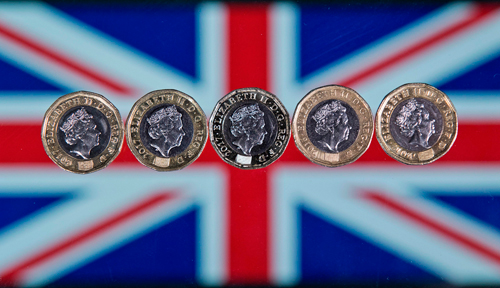Brexit: Fishing in troubled waters
View(s):
In this file photo taken on December 14, 2017 British one pound sterling coins are arranged in front of a Union flag for a photograph in London. (Photo by Justin TALLIS / AFP)
All around the country, it’s the Great Ocean; nevertheless, we still have to import fish for our meal”. You must have heard this many times. Some may lament over it thinking that it’s wrong economics; they may even argue that “it is a problem of not having enough import controls”.
The UK is also facing a similar problem. While the country is surrounded by the ocean and there is a vibrant fisheries industry too, 70 per cent of fish consumed in the UK is said to be imported. The UK exports fish, but it imports more than that! For instance, in 2018 the UK had exported US$2.2 billion worth fish, but imported $2.8 billion worth fish. Why didn’t the UK think of saving that foreign exchange by controlling fish imports?
The UK’s cry was not for controlling fish imports, neither for protecting the domestic fish industry from imported fish. It was rather the opposite: The UK wanted to avoid the impending import duties that were due to come into effect on January 1 of the New Year, as a result of winding-up free trade with the EU. Import duties after the Brexit would have affected the country’s fish imports, resulting in less choices and higher prices in the UK. Equally worrying was that the new import duties in the EU against the UK’s exports were due to make the UK exports expensive and uncompetitive in the EU countries too. Thus, the UK’s four- and half-year long struggle was to defend its “free trade” with the EU even after leaving the EU.
As far as the fishing industry is concerned, the UK’s biggest issue was sharing the “fishing rights” between the UK and the EU. The economic contribution of the fisheries industry to the UK economy is not at all a big deal. This industry employs only 24,000 people out of 33 million labour force and makes only a tiny contribution to the country’s GDP. Similarly, even fish exports worth $490 billion add less than 0.5 per cent to the UK’s total exports.
Nevertheless, it is a politically sensitive key issue in the UK-EU negotiations for a Brexit deal. The issue is important not only for the fishing industry of the UK, but also for some of the EU-member countries such as France, Germany, Belgium, Netherlands and Denmark which have been fishing in the same waters.
Deal on Christmas Eve
All hopes to “leave the EU with a deal” were fading away as the deadline for the Brexit transition was approaching. The people on both sides were also preparing to deal with the new situation after the deadline. Finally, the COVID pandemic issue also multiplied the confusion, negating every hope for a deal. Just a few days before the end of the Brexit transition, the deadlock was broken; as a surprise, here comes a “Brexit deal” on the Christmas Eve.
The UK has now left the EU – the economic union of the 27 European nations which guarantees free movement of goods, services, money and people with harmonized policies and regulations. However, the Brexit deal ensured some form of relationship of the UK to the EU. The deal was aimed at retaining some of the benefits of integration and at avoiding some frictions of the broken relationship.
Let’s take a look at some of the salient features of the deal to figure out to which extent the UK has secured its economic benefits that it enjoyed for nearly 50 years of its integration with the EU.
The Brexit deal covers a wide range of areas for collaboration and integration which would make it different from any category of standard agreements such as a Free Trade Area (FTA) or Custom Union or any other. At the outset, it appears to be that the agreement is on “issue-based” in order to keep the door open for some of the areas for collaboration and integration, while closing the door for others after leaving the pact. Perhaps, it may be the reason why the agreement is also as lengthy as more than 1,200 pages.
Half-baked free trade
The Brexit deal, of course, covers “trade in goods” between the UK and the EU; but it does not necessarily mean that “trade in services” has been covered too. This makes it less than a full FTA, which would entail free trade in both goods and services. However, one of the grave economic concerns was that merchandise trade between the UK and the EU would contract after Brexit because there would be import duties, quota restrictions, and customs procedures on both sides. This would make EU goods imported to the UK more expensive, and the UK goods exported to the EU more expensive too.
 As per the agreement, there will be no import duties or quota restrictions on trade so that current free trade between the UK and the EU will continue; but there will be customs procedures on both sides so that trade is not as free as it used to be.
As per the agreement, there will be no import duties or quota restrictions on trade so that current free trade between the UK and the EU will continue; but there will be customs procedures on both sides so that trade is not as free as it used to be.
It is not yet clear about the agreement on trade in services, which is distinctively important for the UK economy. The UK is a service-sector economy with over 70 per cent value added contribution to GDP and over 80 per cent contribution to employment. The sector is dominated by finance, transport, ICT, trade, and hotels and restaurants. When the economy was hit by the 2009 global financial crisis, the fast recovery of the UK economy was also driven by its quickly-recovered service sector.
Service trade is different from merchandise trade, because the supplying and buying should take place at the same location and at the same time. You cannot “buy a haircut” while you are at home and your service supplier is at his barber shop; you both must meet either at your home or at his barber shop. Free trade in services is hindered not by trade taxes but regulations. As the compatibility of the regulatory mechanisms is no longer valid after the separation of the UK from the EU, it has to be worked out in order to facilitate trade in services.
A new episode
Even though the Brexit deal does not cover both trade in goods and services, it has covered many other issues pertaining to the separation of the UK from the EU. Of course, fishing rights in British waters have been recognised in favour of the UK. In addition, the other areas that have been addressed include travel and visa, EU insurance, fair competition, dispute resolution, sharing of data and information, security issues, and the European law. In most of these areas, the new set up under the Brexit deal is different from what the UK enjoyed previously.
A peculiar area in which the post-Brexit outcome is not yet clear is the economic and political implications of the deal on the position of Northern Ireland, which didn’t vote for Brexit and which didn’t want a “hard border” with the Republic of Ireland.
The political leaders of Northern Ireland have welcomed the deal. Obviously, trade in goods with no import duties and quota restrictions is a positive move to maintain a “soft border” between the two countries – Northern Ireland and Republic of Ireland; it is, indeed, a “soft border” between the UK and the EU, in reality. But the differences that the deal has created between the UK and the EU are far more important than free trade in goods too.
By implication, Northern Ireland is likely to have a closer relationship with the EU (through its “soft border” with the Republic of Ireland) than UK’s relationship with the EU (as outlined in the Brexit deal). This means that Northern Ireland and the rest of the UK would be different from what they appeared to be previously under the EU system. Brexit with a deal is not the end of the story, but rather the beginning of a new episode of the same story.
(The writer is a Professor of Economics at the University of Colombo and can be reached at sirimal@econ.cmb.ac.lk and follow on Twitter @SirimalAshoka).


